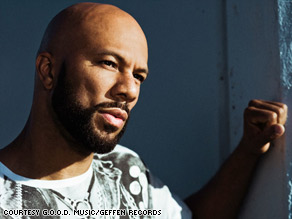(CNN) -- The rapper Common wants to take hip-hop in a new
direction, he says, and he has an unsuspecting ally -- President-elect
Barack Obama.

Common says he was looking for a new sound on his eighth album, "Universal Mind Control."
Obama "is
going to change hip-hop for the better," predicted the rapper, whose
eighth album, "Universal Mind Control" (G.O.O.D. Music/Geffen), hits
shelves Tuesday.
"I really do believe we as hip-hop artists pick
up what's going on in the world and try to reflect that," he told CNN,
outlining his belief that mainstream as well as so-called "conscious"
rappers -- the more socially aware -- will pick up on what he sees as
the more optimistic prospects of an Obama presidency.
"I think
hip-hop artists will have no choice but to talk about different things
and more positive things, and try to bring a brighter side to that
because, even before Barack, I think people had been tired of hearing
the same thing," he said.
Likewise, "Universal Mind Control,"
with its hook-heavy, synthed-out tracks, represents a "broadening" of
hip-hop's audience -- one that demands evolution rather than hackneyed
revamps of old beats, rhythms and rhymes, Common said.  Listen to clips from the album and Common's interview with CNN.com »
Listen to clips from the album and Common's interview with CNN.com »
Not that Common, born Lonnie Rashid Lynn Jr., is altogether removed from the temptations of his hip-hop brethren.
He serves as a spokesman for Lincoln Navigator and purports on his
new album to "rebel in YSL," a reference to designer Yves Saint
Laurent. Money is also a weakness, as Common -- No. 14 on Forbes
magazine's 2008 list of richest rappers -- regularly invokes the
greenbacks he makes and spends.
Still, Common has come at
hip-hop from a different angle from many of his colleagues. He was
generally considered "underground" until he linked up with Kanye West,
who produced his albums "Be" (2005) and "Finding Forever" (2007).
Even now, while paying homage at mainstream hip-hop's altar, the
Chicago-born lyricist also enters parishes where most rappers wouldn't
be seen. He's helped front movements for HIV/AIDS awareness and
vegetarianism, and he's written two children's books emphasizing the
importance of self-esteem.
Lyrically, violence has never been
his thing; soft-drug use has been mentioned but rarely glamorized; he
removed homophobic references from his lyrics years ago; and while
there have been hints of misogyny and the occasional N-word in his
verses, neither has been a staple of his rhymes.
"I've always
been conscious, honestly," he said. "I made a choice on this album,
'Universal Mind Control,' to really make some music that was bright,
that would be a little more lighthearted, just because of what was
going on in the world." Read more from the interview
With a few exceptions, his latest lyrics are consummate Common. In his
beat poet's cadence, the 36-year-old rhymesmith aggressively courts the
ladies, personifies hip-hop, aggrandizes himself and his hometown
(lovingly, "the Chi"), and respectfully doles out props to hip-hop's
forefathers -- most notably to Afrika Bambaataa on the album's title
track.  Hear the title track »
Hear the title track »
The album's sound, however, is atypical, moving -- sometimes jerkily --
from club-banger to anthem to ballad to Top 40. The latter even runs
counter to the opening verse of "Everywhere": "No pop, no pop, no pop,
no pop/We gonna do this thing till the sky just drop."
But the
sound is part of "a whole new sound and a new movement" in hip-hop,
something he explored out of disdain for repetition and predictability,
he said. That might explain Kanye West's relative absence on "Universal Mind Control."
The Louis Vuitton don appears on only one track, the pop-drenched
"Punch Drunk Love." But West has long been credited, even by Common,
with bringing his fellow Chicagoan to the mainstream after "Be" and
"Finding Forever" went gold and leapt up the Billboard 200.
Of course, it's not all Kanye, said Common.
"I'm a true believer that it all boils down to the music, because Kanye
can endorse something, and if people don't like it they ain't gonna get
with it -- regardless of whoever endorses it," he said.
He compared his working relationship with West to the collaboration he enjoyed with The Neptunes' Pharrell Williams
on "Universal Mind Control." Williams, whom Common casually likened to
Quincy Jones, pushed him lyrically, much like West did, he said.
Between Williams and Mr. DJ -- who composed backbeats for some of
OutKast's biggest hits -- Common arrived at the evolution he sought, he
added.
Common also is plotting a change, or at least a detour,
in his career path. Though his past cinematic endeavors have been
primarily gangster flicks, Common has landed a role in the upcoming
"Terminator Salvation" and could play Green Lantern in "Justice League:
Mortal" should the derailed movie get back on track.
"I would
truly love to go increasingly in the acting direction," he said. "My
goal is to be a movie star. I want to be at Will Smith's level. I want
to be co-leading with Leonardo DiCaprio."
Fear not, Common fans.
The aspiring thespian is confident he can pull off both, though hip-hop
might ride sidecar to the silver screen. Acting, he said, seems to
improve his music.
"I don't take as much time overthinking it.
Actually, since 'Be' I've been working on films and each album has been
expanding and increasing, so I feel like I would still make music, but
it wouldn't be the main gig," he said.
Selling albums, Common
said, is about more than good music, and though he stands proudly by
the music he made pre-West, he concedes he didn't do enough to claw his
way up from the underground.
"After you make
good, quality music, then it's your job to go out there and promote it
and to market it and to get it out there to the people. I feel like I
wasn't doing that early on," he said. "Now I am, and I feel like I'm
growing as a songwriter and working with producers that are very
incredible, so I feel all that is contributing to me getting the
recognition that I'm getting."

 del.icio.us
del.icio.us Digg It!
Digg It! yahoo
yahoo Facebook
Facebook rss
rss







Comment On This Story